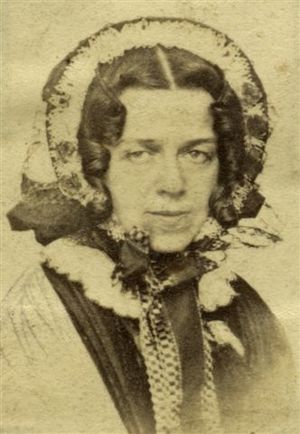Elizabeth Carne facts for kids
Elizabeth Catherine Thomas Carne (1817–1873) was a talented British woman. She was an author, a scientist who studied nature, a geologist (someone who studies rocks and the Earth), and a mineral collector. Elizabeth was also a kind person who helped others, known as a philanthropist. Later in her life, she even became a banker. Today, her scientific work might be called human ecology, which looks at how people and their environment affect each other.
Contents
Elizabeth's Early Life
Elizabeth Carne was born in Cornwall, England, in 1817. She was the seventh of eight children in her family. Her father, Joseph Carne, was a well-known scientist and director of the Cornish Copper Company. Their home, Rivière House, had special rooms in the cellar. These rooms were like laboratories where they studied rocks and minerals. Famous scientists, like Humphry Davy, even visited their home.
Elizabeth grew up in a wealthy family. However, she saw a lot of poverty around her, especially in the mining areas. This made her want to help people who were less fortunate. She was educated at home and loved to read. She studied math, classic books, and learned several languages. Elizabeth helped her father with his large collection of minerals. She also shared his strong interest in how rocks and land forms were created.
Helping Others
When her father passed away in 1858, Elizabeth inherited a lot of money. She used this money to help her community, just like her parents had done. She gave land for a school in Penzance, which opened after her death. She also started schools in other small towns like Wesley Rock, Carfury, and Bosullow.
Elizabeth also helped buy the land for St John's Hall, which became the town hall. She built a museum near her home too. In this museum, she displayed the amazing collection of minerals she and her father had gathered.
A Woman of Science and Writing
Elizabeth Carne was the head of the Penzance Bank from 1858 until she died. This bank was started by her grandfather in 1795. She also loved geology, just like her father. She wrote four important papers for the ‘Transactions of the Royal Geological Society of Cornwall.’ These papers discussed topics like:
- Cliff boulders and how the land and sea used to be in the Land's End area.
- The age of the Maritime Alps mountains.
- How rocks change over time.
- The forces that shaped the Land's End Granite.
Elizabeth made history by becoming the first woman to be chosen as a member of the Royal Geological Society of Cornwall. She was also an early member of the Royal Cornwall Polytechnic Society in Falmouth. Besides her scientific work, Elizabeth wrote many articles for the ‘London Quarterly Review.’ She also wrote several books.
Her Books
Elizabeth Carne wrote a few books during her lifetime:
- ‘Three months' rest at Pau in the winter and spring of 1859’ (published under a pen name in 1860).
- ‘Country Towns and the place they fill in Modern Civilisation,’ 1868.
- ‘England's Three Wants’ (a spiritual pamphlet published without her name in 1871).
- ‘The Realm of Truth,’ 1873.
Death
Elizabeth Carne passed away in Penzance on September 7, 1873. She was buried five days later in Phillack.
See also
 In Spanish: Elizabeth Carne para niños
In Spanish: Elizabeth Carne para niños
 | Lonnie Johnson |
 | Granville Woods |
 | Lewis Howard Latimer |
 | James West |


